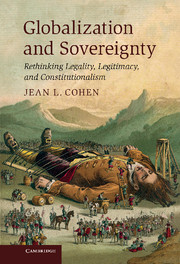Book contents
- Frontmatter
- Contents
- Preface
- Introduction
- 1 Sovereignty in the context of globalization: a constitutional pluralist approach
- 2 Constitutionalism and political form: rethinking federation
- 3 International human rights, sovereignty, and global governance: toward a new political conception
- 4 Sovereignty and human rights in “post-conflict” constitution-making: toward a jus post bellum for “interim occupations”
- 5 Security Council activism in the “war on terror”: legality and legitimacy reconsidered
- Conclusion
- Notes
- Bibliography
- Index
4 - Sovereignty and human rights in “post-conflict” constitution-making: toward a jus post bellum for “interim occupations”
Published online by Cambridge University Press: 05 August 2012
- Frontmatter
- Contents
- Preface
- Introduction
- 1 Sovereignty in the context of globalization: a constitutional pluralist approach
- 2 Constitutionalism and political form: rethinking federation
- 3 International human rights, sovereignty, and global governance: toward a new political conception
- 4 Sovereignty and human rights in “post-conflict” constitution-making: toward a jus post bellum for “interim occupations”
- 5 Security Council activism in the “war on terror”: legality and legitimacy reconsidered
- Conclusion
- Notes
- Bibliography
- Index
Summary
Is there and should there be international law relevant to “post-conflict” constitution-making under foreign occupation? Should we attempt to develop a “jus post bellum”? In an epoch of “humanitarian” and “democratic” interventions, UN-sponsored “regime change” and “nation-building” for “failed” or “outlaw” states, and the prolonged and highly transformative foreign occupations that all of these tend to entail, this question inevitably arises. It is analytically distinct from the issues of the justice of the war itself (jus ad bellum) and the justice of how the war has been conducted (jus in bellum). At issue are the principles and rules regulating “interim administrations” erected by occupying forces in the aftermath of foreign military intervention in the context of a belligerent or humanitarian occupation. Such foreign administrations typically exercise full plenary powers in the “host state” ruling directly over the local population, replacing the legal authority of the former national government, and participating in political and legal “reconstruction” over a lengthy period of time. At stake, then, are not only the human rights, but also the sovereignty and self-determination of the occupied. To put it succinctly, if “post-conflict” constitution-making is to be an exercise in self-determination instead of foreign imposition, if the sovereignty of the occupied state and people is to remain intact while that state and the constitution is being reconstructed, then occupying forces must not themselves engage in expansive legislative and institutional changes that pre-empt autonomous political decision-making by the occupied regarding the nature of their political, social, and economic regime. Yet the need to replace an “ousted sovereign” involved in the grave rights violations that allegedly occasioned humanitarian (or democratic) intervention in the first place and to change rights-violating and typically undemocratic domestic laws, including the constitution, is also undeniable. How, then, can sovereign equality, self-determination, and human rights all be secured in such a context?
- Type
- Chapter
- Information
- Globalization and SovereigntyRethinking Legality, Legitimacy, and Constitutionalism, pp. 223 - 265Publisher: Cambridge University PressPrint publication year: 2012
- 2
- Cited by



